译林版(2020)必修第二册 Unit 4 Exploring literature Grammar and usage 课件(共44张PPT)
文档属性
| 名称 | 译林版(2020)必修第二册 Unit 4 Exploring literature Grammar and usage 课件(共44张PPT) | 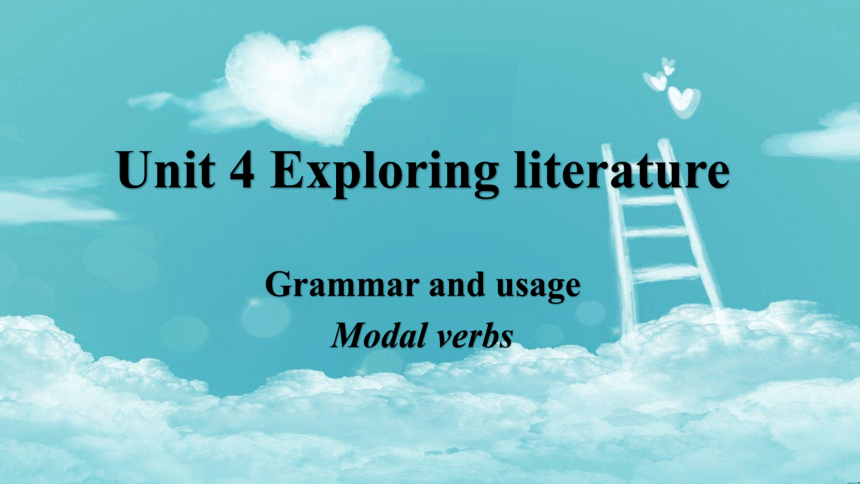 | |
| 格式 | pptx | ||
| 文件大小 | 1.1MB | ||
| 资源类型 | 教案 | ||
| 版本资源 | 牛津译林版(2019) | ||
| 科目 | 英语 | ||
| 更新时间 | 2024-07-23 09:41:56 | ||
图片预览

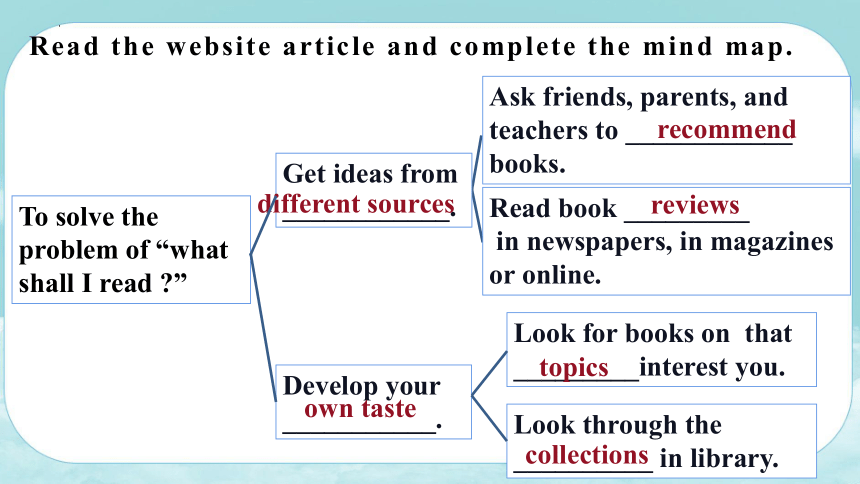

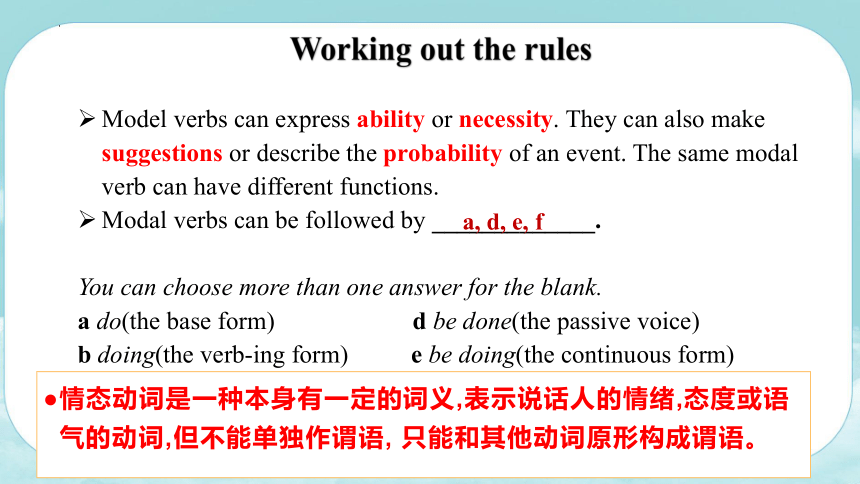
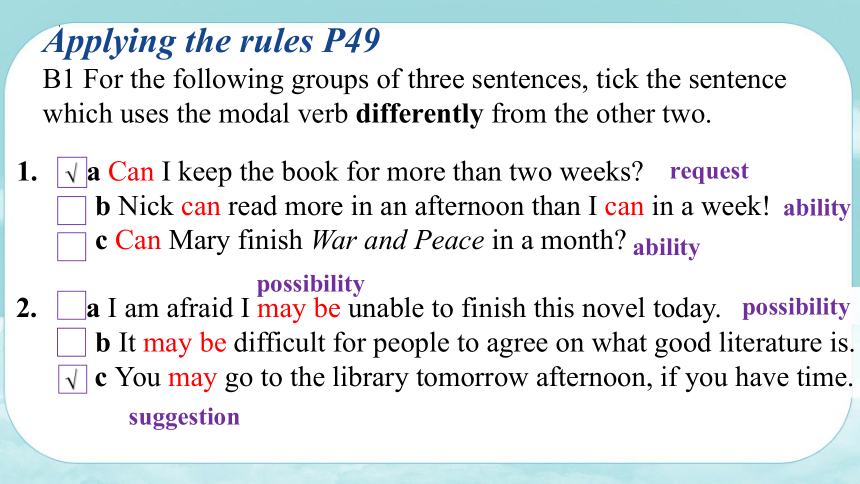
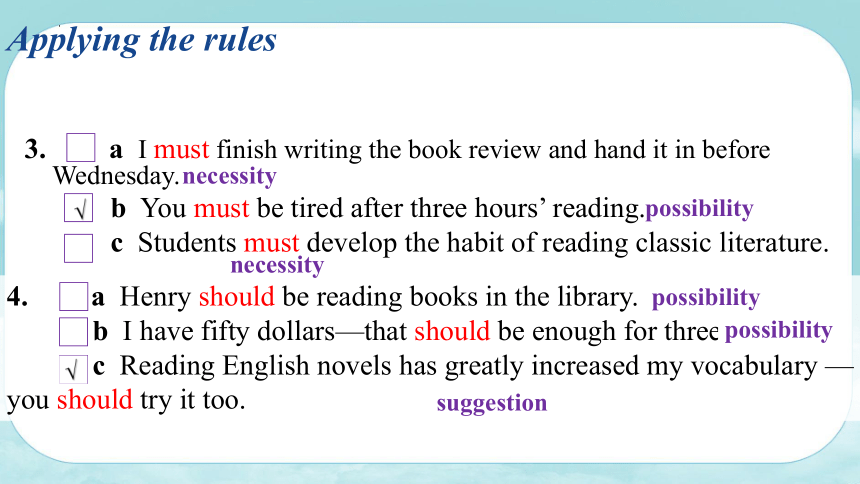
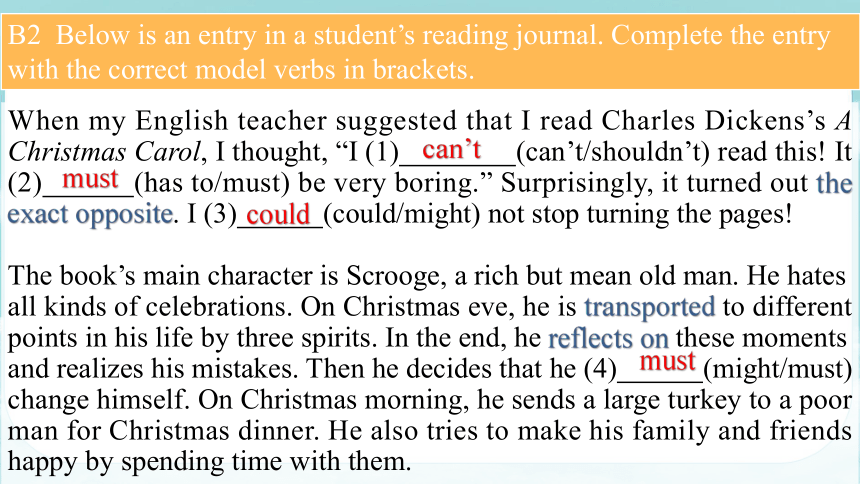

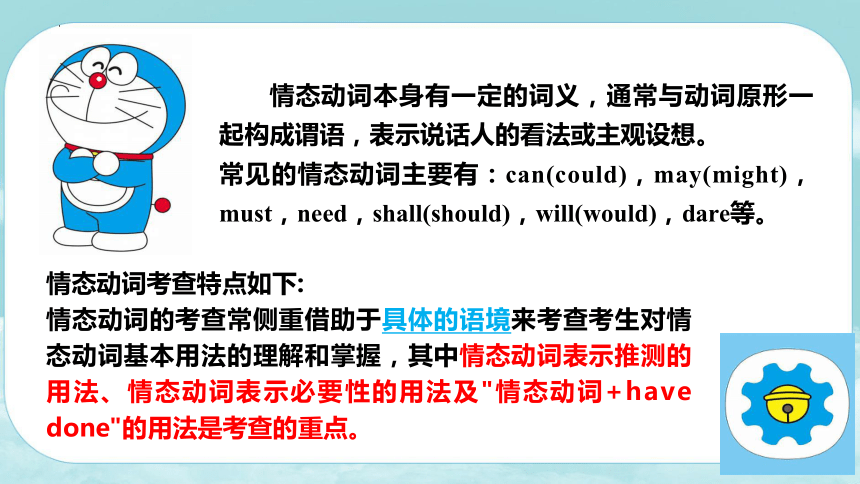



文档简介
(共44张PPT)
Unit 4 Exploring literature
Grammar and usage
Modal verbs
Read the website article and complete the mind map.
To solve the problem of “what shall I read ”
Get ideas from ____________.
Develop your
___________.
Ask friends, parents, and teachers to ____________ books.
Read book _________
in newspapers, in magazines or online.
Look for books on that
_________interest you.
Look through the
__________ in library.
different sources
own taste
recommend
reviews
topics
collections
complete the table in part A.
Suggestion
Ability
Necessity
Possibility
What shall I read
…you can get ideas from different sources…
You could also read book reviews in newspapers in magazines or online.
Teachers in particular can provide suggestions for interesting reading materials that can be found in the library or bookshop easily.
A book review can also tell you whether a book is worth reading or not.
…what books you ought to read.
However, you must also decide for yourself what kind of books to read.
You do not have to read a book just because everyone recommends it.
You might have asked yourself this question more than once.
These ideas should point you in the right direction.
…you may find yourself better able to seek out books to your taste…
Working out the rules
Model verbs can express ability or necessity. They can also make suggestions or describe the probability of an event. The same modal verb can have different functions.
Modal verbs can be followed by _____________.
You can choose more than one answer for the blank.
a do(the base form) d be done(the passive voice)
b doing(the verb-ing form) e be doing(the continuous form)
c did (the past form) f have done (the perfect form)
a, d, e, f
情态动词是一种本身有一定的词义,表示说话人的情绪,态度或语气的动词,但不能单独作谓语, 只能和其他动词原形构成谓语。
Applying the rules P49
B1 For the following groups of three sentences, tick the sentence which uses the modal verb differently from the other two.
a Can I keep the book for more than two weeks
b Nick can read more in an afternoon than I can in a week!
c Can Mary finish War and Peace in a month
a I am afraid I may be unable to finish this novel today.
b It may be difficult for people to agree on what good literature is.
c You may go to the library tomorrow afternoon, if you have time.
√
√
request
ability
ability
possibility
possibility
suggestion
Applying the rules
a I must finish writing the book review and hand it in before Wednesday.
b You must be tired after three hours’ reading.
c Students must develop the habit of reading classic literature.
a Henry should be reading books in the library.
b I have fifty dollars—that should be enough for three books.
c Reading English novels has greatly increased my vocabulary — you should try it too.
√
√
necessity
possibility
necessity
possibility
possibility
suggestion
B2 Below is an entry in a student’s reading plete the entry with the correct model verbs in brackets.
When my English teacher suggested that I read Charles Dickens’s A Christmas Carol, I thought, “I (1) (can’t/shouldn’t) read this! It (2) (has to/must) be very boring.” Surprisingly, it turned out the exact opposite. I (3) (could/might) not stop turning the pages!
The book’s main character is Scrooge, a rich but mean old man. He hates all kinds of celebrations. On Christmas eve, he is transported to different points in his life by three spirits. In the end, he reflects on these moments and realizes his mistakes. Then he decides that he (4) (might/must) change himself. On Christmas morning, he sends a large turkey to a poor man for Christmas dinner. He also tries to make his family and friends happy by spending time with them.
can’t
must
could
must
B2 Below is an entry in a student’s reading plete the entry with the correct model verbs in brackets.
There is something that (5) (can/must) be learnt from A Christmas Carol: we (6) (should/may) treat others with kindness, generosity and love. I think everyone (7) (would/ought to) read this book.
can
should
ought to
情态动词本身有一定的词义,通常与动词原形一起构成谓语,表示说话人的看法或主观设想。
常见的情态动词主要有:can(could),may(might),must,need,shall(should),will(would),dare等。
情态动词考查特点如下:
情态动词的考查常侧重借助于具体的语境来考查考生对情态动词基本用法的理解和掌握,其中情态动词表示推测的用法、情态动词表示必要性的用法及"情态动词+have done"的用法是考查的重点。
强
弱
must 必须 (强调主观看法)
have to 不得不(强调客观事实)
can 不大客气
could 常用
shall 一般疑问句中
should 应该
may 常用
might 过分谦卑
1
should:
表示责任、义务、劝告、建议等,意为“应该;应当”
We should respect our teachers and parents.
表示惊讶、愤怒、失望等情绪,意为“竟然”
It‘s strange that you should say that.
表示可能性,说话者具有一定的推测,常译为“按道理说应该”
It should be a nice day tomorrow.
must的用法
01
表示“必须”,语气比should,ought to强烈。其否定形式为mustn’t (不准,禁止)。
You mustn’t do that,because you must keep your word.你不能那么做,因为你得遵守诺言。
02
表示推测,意为“一定,肯定”,指说话人有根据、有把握地推测。
Jack and Dick must be twins.They look so much alike.
表示“偏要”,“非要”:主要指令人不愉快的事情发生。
Why must you always interrupt me?
表示强调:表示说话者坚定的态度。
I must say that you’re looking extremely well.
表示必然的结果。
All men must die.
考点警示
以must开头的一般疑问句的肯定回答中要用must,否定回答中要用needn’t/don’t have to。
—Must I finish the paper today
—Yes,you must./No,you needn’t/don’t have to.
——我必须今天完成论文吗?
——是的,你必须。 /不,你不必。
考点警示
由need引起的一般疑问句的肯定回答常用must或have to;否定回答常用needn’t。
—Need I wash my clothes now
—Yes,you must/have to./No,you needn’t.
——我现在需要洗我的衣服吗?
——是的,你必须。/不,你不需要。
现将用动原,过去用完成
情态动词后表现在时和将来时,用动词原形do;表过去时,用完成时have done
must have done 一定做过了某事
should have done 本该做……(但没做)
shouldn’t have done 本不该做(但做了)
needn’t have done 本不必做 (但做了)
can’t have done 不可能做了某事
could have done 本来能做成……(但没做成)
couldn’t have done 本不能做(却做了)
may/might have done 可能已经做了某事
练习: 选用括号内合适的内容补全下面句子。
1. I'm sorry I couldn't get in touch with him before he left. I __________________ (should have phoned, have phoned) him earlier.
2. Since they aren't answering their telephone, they ______________ (can have left, must have left).
3. You ____________ (will, may) lead a horse to the water but you _________ (dare, can) not make it drink.
4. Mary _____________________ (couldn't have received, needn't have received) my email; otherwise she would have replied before now.
5. You ____________ (mustn't, needn't) do that if you don't want to.
should have phoned
must have left
may
can
couldn't have received
needn't
6. I don't believe him. He ________ (may not, can't) be serious.
7. If you don't like to swim, you _______________ (may as well, may well) stay at home.
8. They hurried there only to find the meeting canceled. In fact, they __________________ (needn't have gone, wouldn't have gone) at all.
9. She was ill. She ______________________ (couldn't have attended, mustn't attend) the meeting here.
10. Carey didn't go to the party last night because she ________________ (should look after, had to look after) the baby for her sister until 9:30.
needn't have gone
couldn't have attended
had to look after
can't
may as well
C Fill in the blanks with the correct forms of the verbs in the brackets, using the proper modal verbs. P76
1.— What’s the weather like in your hometown Is it cold in winter
— Yes, it (be) as cold as -30℃ in winter.
2. — I want to invite Tom to see a film tonight. Has he arrived yet
— Yes, he just arrived. But after four hours’ ride, he ______________ (be) tired now and he (prefer) to stay in tonight.
3. — Is Betty still playing the piano
— Yes. I asked her to stop and take a rest, but she______________ (not listen).
can be
must/may/might be
wouldn’t listen
may/might prefer
C Fill in the blanks with the correct forms of the verbs in the brackets, using the proper modal verbs. P76
4.—What does the rule say about using the reading room
— No one (talk) loudly.
5.— Your car looks great. It (cost) you a lot of money.
— Yes, it’s quite expensive.
6.— How long can I keep the book
— The books that students borrow (return) to the library within two weeks.
shall/should talk
must have cost
must/shall be returned
1.昨晚那间屋子着火了,但那家人都逃了出来;
2.我不会告诉老师这件事;
3.办公室不能抽烟 ;
4.灯还亮着,他肯定在书房读小说;
1.The house caught fire last night, but the family was all able to escape.
用情态动词翻译句子
4.The light is still on. He must be reading in the study.
3.You mustn’t smoke in the office.
2.I won't tell the teacher about it .
1. Jim says we ______ stay in his house as long as we leave it clean and tidy.
A. must B. can C. need D. should
B
2. The professor warned the students that on no account _______ use mobile phones in his class.
A. should they B. they should
C. dare they D. they dare
A
3. I can’t find my purse. I ________ it in the supermarket yesterday, but I’m not sure.
A. should leave B. must have left
C. might leave D. could have left
D
链接高考
易 错 防 范
1.误用情态动词
典例1 John,look at the time. ________ you play the piano at such a late hour
易错警示:此题易误填need。解题时要注意语境,体会语气。
答案:Must 句意:约翰,看看时间。这么晚了你偏要弹钢琴吗?从说话人的语气判断,含有不满之意。must在此表示特定的语气和态度,意为“偏要,硬要”。
典例2 I ________ have been more than six years old when the accident happened.
易错警示:此题易误填mustn't。mustn't意为“一定不能,被禁止”,不能与have done连用。
答案:couldn't 句意:在事故发生时我不可能超过6岁。shouldn't have done表示“本来不该做而实际上却做了”,needn't have done表示“本来不必做而实际上却做了”,均不符合题意。
2.虚拟语气
典例3 ________it snow, the crops would grow better.
易错警示:与将来事实相反的虚拟语气,if从句中情态动词只用should,不用would,might,will。
答案:Should 句意:如果下雪的话,这些庄稼会长得更好。本题考查与将来事实相反的if条件句,if从句的谓语动词形式为:①过去式;②should+动词原形;③were to+动词原形。
1. can & could
1. 表能够做某事(具备某种能力);could主要指过去能够;
Two eyes can see more than one.
Could the girl read before she went to school
2. 表示请求和许可(could表示更委婉的语气,回答时只能用can);用于否定句中表不允许。
Can I have a look at your new pen
You can’t wear jeans at work.
3. 用于肯定的陈述句中,表示理论上或习惯上的可能性。
表示猜测,意为“可能”,一般用于疑问句和否定句(could是过去时);若用于肯定句中表常有的行为和情形,意为“有时会/可能”。
As we all know,anyone can make mistakes.
My mom can be stubborn sometimes.
That can’t be Kelly—she’s in New York. (“不可能是”)
4. 习惯用法“cannot...too...”表示“无论怎样……都不过分,越……越好”。有时cannot可用can never替代。
We cannot thank you too much for what you’ve done for us.
shall
(1)用于第一、第三人称的疑问句中,表征询意见或请求允许,
多与I或we连用。
What shall we do this weekend
When shall my brother be able to leave hospital
(2)用于第二、第三人称,表示说话人的命令、警告、允诺或威胁。
He shall be punished.(威胁)
You shall go with me.(命令)
You shall have a new dress for your birthday.(允诺)
(3) 常用于主语是第三人称的条约、法律法规、规章制度等文件中表“义务”或“规定”。
Every student shall wear school uniform at school.
2. shall & should
表示劝告或建议,意为“应该”,其同义词是ought to;也可表示推测或表示惊讶、愤怒、失望等情感;还可表示不确定,“万一”。
You should go to class right away.
The film should be great as it is starring first-class actors.
You should be polite to your teachers.
They should be home by now.
If it should rain tomorrow, the sports meeting would be postponed.
I find it astonishing that he should be so rude to you.
建议
推测
万一
竟然
建议
推测
should
3. will & would
1. 表意愿,用于各种人称的陈述句;
I will do anything for you.
They said that they would fight against the haze.
2. 表请求允许,用于疑问句;
Will/Would you please take a message for me
3. 表习惯;
He would spend hours on the telephone.
4. 主语为物时,多用于否定句中,意为“不起作用”。
The door won’t open.
3. will & would
She will listen to music, alone in her room, for hours.
They won’t lend us any more money.
Would you mind leaving me alone for a few minutes
Fish will die without water.
习惯
意愿
请求允许
习惯
4. may/ might
1. 表允许,might可以指过去时间或现在时间,语气更委婉。
以may/might开头的问句在否定回答中要用mustn’t/can’t。
You may take whatever you like.
May (Might) I ask for a photo of your baby
2. 表可能(事实上)。might可以指过去时间或现在时间,但语气更加不肯定。
He may be at home, but I’m not sure.
She may/might not know about it.
3.may还可用于祈使句表示祝愿。
May you succeed!
5. must
1. 用于肯定句中表说话人的意志或义务;坚决要求做某事;
否定mustn’t 表禁止。
You must keep your word.
Cars mustn’t park in front of the entrance.
2. 在以must 开头的疑问句中,肯定回答用must;
否定回答用needn’t 或don’t have to。
—Must he hand in his exercise books now
—Yes, he must. / No, he needn’t. / No, he don’t have to.
3. 表示可能性或肯定的推断。意为“想必、准是、一定”等,
只用于肯定句。
He must be ill. His cheeks are so pale.
There must be other ways to solve the problem.
4. 表说话人生气或不满的情绪,意为“偏要;非得”,常指令人不快的事情。
The car must break down just when I was about to set off.
Must you interrupt me now Can’t you see I’m busy
6. need & dare
1. need 和dare可以作实义动词或情态动词。作情态动词时,后跟动词原形,表示“需要,有必要”,无人称和数的变化,多用于否定句、疑问句或条件句中。
I dare not walk through the woods at night.
You needn’t go there now.
Need I hand in the paper now
2. 作实义动词时,同其他实义动词一样,可用于各种句式,有时态、人称和数的变化,构成否定句和疑问句时要借助于助动词。在否定句和疑问句中不定式符号to也可以省略。
You don’t need to be so worried. You need to be more careful.
They don’t dare (to) make a sound while their parents are sleeping.
情态动词基本语法功能:
用法 请求/许可 可能/推测 义务/职责 意图/打算 意愿/愿意 意志/决心 才能/能力
can/could √ √ √
may/might √ √
shall/should √ √ √ √ √ √
will/would √ √ √ √ √
must √ √
ought to √ √
考点二:表推测的情态动词
1. 对现在或客观事实的肯定推测
must:肯定;准是;想必是
can/could:用于疑问句, 表怀疑
should:很可能, 应该…, 指按常理推测
may/might:也许, 大概;表把握不大的推测
—What are you doing this Saturday
—I’m not sure, but I _______ go to the cinema.
—Good morning. I’ve got an appointment with Smith.
—Hello. You ______ be Mrs. Peter.
might/may
must
2.对现在情况或客观事实的否定推测
can’t:不可能;推测的语气相当有把握
couldn’t:不可能;语气较委婉
may(might) not:可能不,也许不,表不大有把握的推测
It can’t be the postman at the door. It’s only five o’clock.
The younger people might not like the idea.
3. 对过去情况的推测
must have done:
can/could have done:
can’t have done/ couldn’t have done:
may/might(not) have done:
过去一定做过某事
过去不可能做某事
过去可能做过某事
过去可能(没)做过某事
From what you said,she must have told you all about it.
You might have read about the news in the papers.
He couldn’t have done the research without your support.
Tom could have finished the paper on his own.
考点三:情态动词+ have done 的其他用法
should/ought to have done
表过去本该做却没有做
shouldn’t/ ought not to have done
表过去本不该做却做了
could have done
表本可以/本可能做某事却没做
might have done
表本可能但实际没有发生的事
needn’t have done
表本来不需要做却做了
考点三:情态动词+ have done 的其他用法
should/ought to have done
表过去本该做却没有做
shouldn’t/ ought not to have done
表过去本不该做却做了
could have done
表本可以/本可能做某事却没做
might have done
表本可能但实际没有发生的事
needn’t have done
表本来不需要做却做了
You should have prepared for the exam, but you spent your time playing.
You shouldn’t have watched that movie — it’ll give you horrible dreams.
You could have done better,but you were too careless.
He may/might have missed the bus. But I’m still not sure about it.
I needn’t have worried before I came to the new school.
(4组) can/could,
may/might,
shall/should,
will/would
(4对) have to, had better,
ought to, used to
(3个) must, need, dare
Review
常见的情态动词归纳
构成 意义
may/might have done “可能已经做了某事”
“一定做过某事”
“本应该做某事却没做”
“本不应该做某事,却做了”
“本不必做某事, 却做了”
“过去本来能够做某事,却没做”
“过去不可能做某事”
must have done
should/ought to have done
shouldn’t/oughtn’t to have done
needn’t have done
could have done
can’t/couldn’t have done
情态动词+have done的用法归纳
Unit 4 Exploring literature
Grammar and usage
Modal verbs
Read the website article and complete the mind map.
To solve the problem of “what shall I read ”
Get ideas from ____________.
Develop your
___________.
Ask friends, parents, and teachers to ____________ books.
Read book _________
in newspapers, in magazines or online.
Look for books on that
_________interest you.
Look through the
__________ in library.
different sources
own taste
recommend
reviews
topics
collections
complete the table in part A.
Suggestion
Ability
Necessity
Possibility
What shall I read
…you can get ideas from different sources…
You could also read book reviews in newspapers in magazines or online.
Teachers in particular can provide suggestions for interesting reading materials that can be found in the library or bookshop easily.
A book review can also tell you whether a book is worth reading or not.
…what books you ought to read.
However, you must also decide for yourself what kind of books to read.
You do not have to read a book just because everyone recommends it.
You might have asked yourself this question more than once.
These ideas should point you in the right direction.
…you may find yourself better able to seek out books to your taste…
Working out the rules
Model verbs can express ability or necessity. They can also make suggestions or describe the probability of an event. The same modal verb can have different functions.
Modal verbs can be followed by _____________.
You can choose more than one answer for the blank.
a do(the base form) d be done(the passive voice)
b doing(the verb-ing form) e be doing(the continuous form)
c did (the past form) f have done (the perfect form)
a, d, e, f
情态动词是一种本身有一定的词义,表示说话人的情绪,态度或语气的动词,但不能单独作谓语, 只能和其他动词原形构成谓语。
Applying the rules P49
B1 For the following groups of three sentences, tick the sentence which uses the modal verb differently from the other two.
a Can I keep the book for more than two weeks
b Nick can read more in an afternoon than I can in a week!
c Can Mary finish War and Peace in a month
a I am afraid I may be unable to finish this novel today.
b It may be difficult for people to agree on what good literature is.
c You may go to the library tomorrow afternoon, if you have time.
√
√
request
ability
ability
possibility
possibility
suggestion
Applying the rules
a I must finish writing the book review and hand it in before Wednesday.
b You must be tired after three hours’ reading.
c Students must develop the habit of reading classic literature.
a Henry should be reading books in the library.
b I have fifty dollars—that should be enough for three books.
c Reading English novels has greatly increased my vocabulary — you should try it too.
√
√
necessity
possibility
necessity
possibility
possibility
suggestion
B2 Below is an entry in a student’s reading plete the entry with the correct model verbs in brackets.
When my English teacher suggested that I read Charles Dickens’s A Christmas Carol, I thought, “I (1) (can’t/shouldn’t) read this! It (2) (has to/must) be very boring.” Surprisingly, it turned out the exact opposite. I (3) (could/might) not stop turning the pages!
The book’s main character is Scrooge, a rich but mean old man. He hates all kinds of celebrations. On Christmas eve, he is transported to different points in his life by three spirits. In the end, he reflects on these moments and realizes his mistakes. Then he decides that he (4) (might/must) change himself. On Christmas morning, he sends a large turkey to a poor man for Christmas dinner. He also tries to make his family and friends happy by spending time with them.
can’t
must
could
must
B2 Below is an entry in a student’s reading plete the entry with the correct model verbs in brackets.
There is something that (5) (can/must) be learnt from A Christmas Carol: we (6) (should/may) treat others with kindness, generosity and love. I think everyone (7) (would/ought to) read this book.
can
should
ought to
情态动词本身有一定的词义,通常与动词原形一起构成谓语,表示说话人的看法或主观设想。
常见的情态动词主要有:can(could),may(might),must,need,shall(should),will(would),dare等。
情态动词考查特点如下:
情态动词的考查常侧重借助于具体的语境来考查考生对情态动词基本用法的理解和掌握,其中情态动词表示推测的用法、情态动词表示必要性的用法及"情态动词+have done"的用法是考查的重点。
强
弱
must 必须 (强调主观看法)
have to 不得不(强调客观事实)
can 不大客气
could 常用
shall 一般疑问句中
should 应该
may 常用
might 过分谦卑
1
should:
表示责任、义务、劝告、建议等,意为“应该;应当”
We should respect our teachers and parents.
表示惊讶、愤怒、失望等情绪,意为“竟然”
It‘s strange that you should say that.
表示可能性,说话者具有一定的推测,常译为“按道理说应该”
It should be a nice day tomorrow.
must的用法
01
表示“必须”,语气比should,ought to强烈。其否定形式为mustn’t (不准,禁止)。
You mustn’t do that,because you must keep your word.你不能那么做,因为你得遵守诺言。
02
表示推测,意为“一定,肯定”,指说话人有根据、有把握地推测。
Jack and Dick must be twins.They look so much alike.
表示“偏要”,“非要”:主要指令人不愉快的事情发生。
Why must you always interrupt me?
表示强调:表示说话者坚定的态度。
I must say that you’re looking extremely well.
表示必然的结果。
All men must die.
考点警示
以must开头的一般疑问句的肯定回答中要用must,否定回答中要用needn’t/don’t have to。
—Must I finish the paper today
—Yes,you must./No,you needn’t/don’t have to.
——我必须今天完成论文吗?
——是的,你必须。 /不,你不必。
考点警示
由need引起的一般疑问句的肯定回答常用must或have to;否定回答常用needn’t。
—Need I wash my clothes now
—Yes,you must/have to./No,you needn’t.
——我现在需要洗我的衣服吗?
——是的,你必须。/不,你不需要。
现将用动原,过去用完成
情态动词后表现在时和将来时,用动词原形do;表过去时,用完成时have done
must have done 一定做过了某事
should have done 本该做……(但没做)
shouldn’t have done 本不该做(但做了)
needn’t have done 本不必做 (但做了)
can’t have done 不可能做了某事
could have done 本来能做成……(但没做成)
couldn’t have done 本不能做(却做了)
may/might have done 可能已经做了某事
练习: 选用括号内合适的内容补全下面句子。
1. I'm sorry I couldn't get in touch with him before he left. I __________________ (should have phoned, have phoned) him earlier.
2. Since they aren't answering their telephone, they ______________ (can have left, must have left).
3. You ____________ (will, may) lead a horse to the water but you _________ (dare, can) not make it drink.
4. Mary _____________________ (couldn't have received, needn't have received) my email; otherwise she would have replied before now.
5. You ____________ (mustn't, needn't) do that if you don't want to.
should have phoned
must have left
may
can
couldn't have received
needn't
6. I don't believe him. He ________ (may not, can't) be serious.
7. If you don't like to swim, you _______________ (may as well, may well) stay at home.
8. They hurried there only to find the meeting canceled. In fact, they __________________ (needn't have gone, wouldn't have gone) at all.
9. She was ill. She ______________________ (couldn't have attended, mustn't attend) the meeting here.
10. Carey didn't go to the party last night because she ________________ (should look after, had to look after) the baby for her sister until 9:30.
needn't have gone
couldn't have attended
had to look after
can't
may as well
C Fill in the blanks with the correct forms of the verbs in the brackets, using the proper modal verbs. P76
1.— What’s the weather like in your hometown Is it cold in winter
— Yes, it (be) as cold as -30℃ in winter.
2. — I want to invite Tom to see a film tonight. Has he arrived yet
— Yes, he just arrived. But after four hours’ ride, he ______________ (be) tired now and he (prefer) to stay in tonight.
3. — Is Betty still playing the piano
— Yes. I asked her to stop and take a rest, but she______________ (not listen).
can be
must/may/might be
wouldn’t listen
may/might prefer
C Fill in the blanks with the correct forms of the verbs in the brackets, using the proper modal verbs. P76
4.—What does the rule say about using the reading room
— No one (talk) loudly.
5.— Your car looks great. It (cost) you a lot of money.
— Yes, it’s quite expensive.
6.— How long can I keep the book
— The books that students borrow (return) to the library within two weeks.
shall/should talk
must have cost
must/shall be returned
1.昨晚那间屋子着火了,但那家人都逃了出来;
2.我不会告诉老师这件事;
3.办公室不能抽烟 ;
4.灯还亮着,他肯定在书房读小说;
1.The house caught fire last night, but the family was all able to escape.
用情态动词翻译句子
4.The light is still on. He must be reading in the study.
3.You mustn’t smoke in the office.
2.I won't tell the teacher about it .
1. Jim says we ______ stay in his house as long as we leave it clean and tidy.
A. must B. can C. need D. should
B
2. The professor warned the students that on no account _______ use mobile phones in his class.
A. should they B. they should
C. dare they D. they dare
A
3. I can’t find my purse. I ________ it in the supermarket yesterday, but I’m not sure.
A. should leave B. must have left
C. might leave D. could have left
D
链接高考
易 错 防 范
1.误用情态动词
典例1 John,look at the time. ________ you play the piano at such a late hour
易错警示:此题易误填need。解题时要注意语境,体会语气。
答案:Must 句意:约翰,看看时间。这么晚了你偏要弹钢琴吗?从说话人的语气判断,含有不满之意。must在此表示特定的语气和态度,意为“偏要,硬要”。
典例2 I ________ have been more than six years old when the accident happened.
易错警示:此题易误填mustn't。mustn't意为“一定不能,被禁止”,不能与have done连用。
答案:couldn't 句意:在事故发生时我不可能超过6岁。shouldn't have done表示“本来不该做而实际上却做了”,needn't have done表示“本来不必做而实际上却做了”,均不符合题意。
2.虚拟语气
典例3 ________it snow, the crops would grow better.
易错警示:与将来事实相反的虚拟语气,if从句中情态动词只用should,不用would,might,will。
答案:Should 句意:如果下雪的话,这些庄稼会长得更好。本题考查与将来事实相反的if条件句,if从句的谓语动词形式为:①过去式;②should+动词原形;③were to+动词原形。
1. can & could
1. 表能够做某事(具备某种能力);could主要指过去能够;
Two eyes can see more than one.
Could the girl read before she went to school
2. 表示请求和许可(could表示更委婉的语气,回答时只能用can);用于否定句中表不允许。
Can I have a look at your new pen
You can’t wear jeans at work.
3. 用于肯定的陈述句中,表示理论上或习惯上的可能性。
表示猜测,意为“可能”,一般用于疑问句和否定句(could是过去时);若用于肯定句中表常有的行为和情形,意为“有时会/可能”。
As we all know,anyone can make mistakes.
My mom can be stubborn sometimes.
That can’t be Kelly—she’s in New York. (“不可能是”)
4. 习惯用法“cannot...too...”表示“无论怎样……都不过分,越……越好”。有时cannot可用can never替代。
We cannot thank you too much for what you’ve done for us.
shall
(1)用于第一、第三人称的疑问句中,表征询意见或请求允许,
多与I或we连用。
What shall we do this weekend
When shall my brother be able to leave hospital
(2)用于第二、第三人称,表示说话人的命令、警告、允诺或威胁。
He shall be punished.(威胁)
You shall go with me.(命令)
You shall have a new dress for your birthday.(允诺)
(3) 常用于主语是第三人称的条约、法律法规、规章制度等文件中表“义务”或“规定”。
Every student shall wear school uniform at school.
2. shall & should
表示劝告或建议,意为“应该”,其同义词是ought to;也可表示推测或表示惊讶、愤怒、失望等情感;还可表示不确定,“万一”。
You should go to class right away.
The film should be great as it is starring first-class actors.
You should be polite to your teachers.
They should be home by now.
If it should rain tomorrow, the sports meeting would be postponed.
I find it astonishing that he should be so rude to you.
建议
推测
万一
竟然
建议
推测
should
3. will & would
1. 表意愿,用于各种人称的陈述句;
I will do anything for you.
They said that they would fight against the haze.
2. 表请求允许,用于疑问句;
Will/Would you please take a message for me
3. 表习惯;
He would spend hours on the telephone.
4. 主语为物时,多用于否定句中,意为“不起作用”。
The door won’t open.
3. will & would
She will listen to music, alone in her room, for hours.
They won’t lend us any more money.
Would you mind leaving me alone for a few minutes
Fish will die without water.
习惯
意愿
请求允许
习惯
4. may/ might
1. 表允许,might可以指过去时间或现在时间,语气更委婉。
以may/might开头的问句在否定回答中要用mustn’t/can’t。
You may take whatever you like.
May (Might) I ask for a photo of your baby
2. 表可能(事实上)。might可以指过去时间或现在时间,但语气更加不肯定。
He may be at home, but I’m not sure.
She may/might not know about it.
3.may还可用于祈使句表示祝愿。
May you succeed!
5. must
1. 用于肯定句中表说话人的意志或义务;坚决要求做某事;
否定mustn’t 表禁止。
You must keep your word.
Cars mustn’t park in front of the entrance.
2. 在以must 开头的疑问句中,肯定回答用must;
否定回答用needn’t 或don’t have to。
—Must he hand in his exercise books now
—Yes, he must. / No, he needn’t. / No, he don’t have to.
3. 表示可能性或肯定的推断。意为“想必、准是、一定”等,
只用于肯定句。
He must be ill. His cheeks are so pale.
There must be other ways to solve the problem.
4. 表说话人生气或不满的情绪,意为“偏要;非得”,常指令人不快的事情。
The car must break down just when I was about to set off.
Must you interrupt me now Can’t you see I’m busy
6. need & dare
1. need 和dare可以作实义动词或情态动词。作情态动词时,后跟动词原形,表示“需要,有必要”,无人称和数的变化,多用于否定句、疑问句或条件句中。
I dare not walk through the woods at night.
You needn’t go there now.
Need I hand in the paper now
2. 作实义动词时,同其他实义动词一样,可用于各种句式,有时态、人称和数的变化,构成否定句和疑问句时要借助于助动词。在否定句和疑问句中不定式符号to也可以省略。
You don’t need to be so worried. You need to be more careful.
They don’t dare (to) make a sound while their parents are sleeping.
情态动词基本语法功能:
用法 请求/许可 可能/推测 义务/职责 意图/打算 意愿/愿意 意志/决心 才能/能力
can/could √ √ √
may/might √ √
shall/should √ √ √ √ √ √
will/would √ √ √ √ √
must √ √
ought to √ √
考点二:表推测的情态动词
1. 对现在或客观事实的肯定推测
must:肯定;准是;想必是
can/could:用于疑问句, 表怀疑
should:很可能, 应该…, 指按常理推测
may/might:也许, 大概;表把握不大的推测
—What are you doing this Saturday
—I’m not sure, but I _______ go to the cinema.
—Good morning. I’ve got an appointment with Smith.
—Hello. You ______ be Mrs. Peter.
might/may
must
2.对现在情况或客观事实的否定推测
can’t:不可能;推测的语气相当有把握
couldn’t:不可能;语气较委婉
may(might) not:可能不,也许不,表不大有把握的推测
It can’t be the postman at the door. It’s only five o’clock.
The younger people might not like the idea.
3. 对过去情况的推测
must have done:
can/could have done:
can’t have done/ couldn’t have done:
may/might(not) have done:
过去一定做过某事
过去不可能做某事
过去可能做过某事
过去可能(没)做过某事
From what you said,she must have told you all about it.
You might have read about the news in the papers.
He couldn’t have done the research without your support.
Tom could have finished the paper on his own.
考点三:情态动词+ have done 的其他用法
should/ought to have done
表过去本该做却没有做
shouldn’t/ ought not to have done
表过去本不该做却做了
could have done
表本可以/本可能做某事却没做
might have done
表本可能但实际没有发生的事
needn’t have done
表本来不需要做却做了
考点三:情态动词+ have done 的其他用法
should/ought to have done
表过去本该做却没有做
shouldn’t/ ought not to have done
表过去本不该做却做了
could have done
表本可以/本可能做某事却没做
might have done
表本可能但实际没有发生的事
needn’t have done
表本来不需要做却做了
You should have prepared for the exam, but you spent your time playing.
You shouldn’t have watched that movie — it’ll give you horrible dreams.
You could have done better,but you were too careless.
He may/might have missed the bus. But I’m still not sure about it.
I needn’t have worried before I came to the new school.
(4组) can/could,
may/might,
shall/should,
will/would
(4对) have to, had better,
ought to, used to
(3个) must, need, dare
Review
常见的情态动词归纳
构成 意义
may/might have done “可能已经做了某事”
“一定做过某事”
“本应该做某事却没做”
“本不应该做某事,却做了”
“本不必做某事, 却做了”
“过去本来能够做某事,却没做”
“过去不可能做某事”
must have done
should/ought to have done
shouldn’t/oughtn’t to have done
needn’t have done
could have done
can’t/couldn’t have done
情态动词+have done的用法归纳
